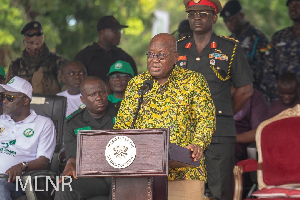President Nana Addo Dankwa Akufo-Addo has stated that for drug policies to be effective, they must be grounded in scientific research, respect human rights, and demonstrate compassion and a profound understanding of the social, economic, and health implications of drug use.
He highlighted the global socio-economic situation that compels individuals to make risk-taking decisions, such as drug trafficking and abuse, noting that the dimensions and impact of drug trafficking are intensive, extensive, and complex.
The President made these remarks in a speech delivered on his behalf by Mr. Henry Quartey, the Minister for Interior, at the 2024 International Day Against Drug Abuse and Illicit Trafficking, also known as World Drug Day (WDD), in Accra.
The event, which also marked the launch of the 2023 World Drug Report, was themed "The Evidence is Clear: Invest in Prevention."
World Drug Day is observed annually on December 7, as designated by United Nations General Assembly resolution 42/112 in 1987, for Member States to raise awareness of the risks and effects of drug abuse and illicit drug trafficking, as well as to consider the most effective countermeasures.
The President explained that the theme aims to draw global attention to the urgent need to intensify efforts to prevent trafficking and abuse of illicit drugs, which have caused devastating health conditions for millions worldwide.
He pointed out that drug trafficking facilitates drug consumption, leading to the development of substance use disorders (SUDs), a highly destructive and concerning health condition.
According to the 2023 World Drug Report, drug use disorders are damaging health, including mental health, safety, and well-being. The President noted that stigma and discrimination reduce the likelihood of individuals with drug use disorders receiving the help they need, with fewer than 20 percent currently in treatment and access being highly unequal.
President Akufo-Addo acknowledged that Ghana has not been spared the impact of drug trafficking, abuse, and related health problems. However, he expressed satisfaction that Ghana recognizes the challenges associated with implementing international and domestic drug policies, particularly concerning the health and safety of Ghanaian society.
He affirmed the government's commitment to continue providing necessary resources to the Narcotics Control Commission and other security agencies to perform their mandates efficiently, thus ensuring the safety and security of all Ghanaians.
The President highlighted Ghana's proactive steps in reforming the country's drug policies, including the enactment of the Narcotics Control Commission Act, 2020 (Act 1019), which addresses the nation's drug challenges.
He urged everyone to support law enforcement agencies in combating the drug menace.
Mr. Kenneth Adu-Amanfoh, the Director-General of the Narcotics Control Commission (NACOC), reported that last year, NACOC's Demand Reduction Directorate sensitized a total of 308,312 students across 1,322 educational institutions at all levels.
Furthermore, NACOC engaged 63 communities and 73 faith-based institutions, achievements made possible through collaboration with other relevant state institutions.
The Director-General revealed that NACOC is working with partners to establish Drop-In Centers in some regional capitals to offer counseling services to individuals suffering from SUDs, providing essential support for addiction recovery.
"NACOC is committed to ensuring that a scientific evidence-based approach is used in developing prevention outreach programs that are tested and effective in addressing drug use among the youth," he concluded.
Health News of Friday, 28 June 2024
Source: kasapafmonline.com
Effective drug policy must be based on scientific research – Akufo-Addo
Entertainment
















